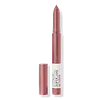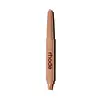What's inside
What's inside
 Key Ingredients
Key Ingredients

 Benefits
Benefits

 Concerns
Concerns

 Ingredients Side-by-side
Ingredients Side-by-side

Isododecane
EmollientPolyethylene
AbrasiveTrimethylsiloxyphenyl Dimethicone
Isohexadecane
EmollientDimethicone
EmollientAcrylates/Dimethicone Copolymer
Skin ConditioningPolypropylsilsesquioxane
Stearyl Heptanoate
EmollientHydrogenated Polyisobutene
EmollientHydrogenated Styrene/Methylstyrene/Indene Copolymer
Alumina
AbrasiveSynthetic Fluorphlogopite
Calcium Aluminum Borosilicate
Limonene
PerfumingCalcium Sodium Borosilicate
Aluminum Hydroxide
EmollientPolybutylene Terephthalate
Silica
AbrasiveMagnesium Silicate
AbsorbentSilica Silylate
EmollientEthylene/Va Copolymer
Emulsion StabilisingAcrylates Copolymer
Pentaerythrityl Tetra-Di-T-Butyl Hydroxyhydrocinnamate
AntioxidantBenzyl Benzoate
AntimicrobialTin Oxide
AbrasiveBenzyl Alcohol
PerfumingCitronellol
PerfumingLinalool
PerfumingGeraniol
PerfumingDisodium Stearoyl Glutamate
CleansingTocopherol
AntioxidantParfum
MaskingCI 77891
Cosmetic ColorantCI 77491
Cosmetic ColorantCI 77492
Cosmetic ColorantCI 77499
Cosmetic ColorantCI 45410
Cosmetic ColorantCI 15850
Cosmetic ColorantCI 45380
Cosmetic ColorantMica
Cosmetic ColorantCI 15985
Cosmetic ColorantCI 19140
Cosmetic ColorantCI 77163
Cosmetic ColorantCI 17200
Cosmetic ColorantCI 42090
Cosmetic ColorantCI 75470
Cosmetic ColorantIsododecane, Polyethylene, Trimethylsiloxyphenyl Dimethicone, Isohexadecane, Dimethicone, Acrylates/Dimethicone Copolymer, Polypropylsilsesquioxane, Stearyl Heptanoate, Hydrogenated Polyisobutene, Hydrogenated Styrene/Methylstyrene/Indene Copolymer, Alumina, Synthetic Fluorphlogopite, Calcium Aluminum Borosilicate, Limonene, Calcium Sodium Borosilicate, Aluminum Hydroxide, Polybutylene Terephthalate, Silica, Magnesium Silicate, Silica Silylate, Ethylene/Va Copolymer, Acrylates Copolymer, Pentaerythrityl Tetra-Di-T-Butyl Hydroxyhydrocinnamate, Benzyl Benzoate, Tin Oxide, Benzyl Alcohol, Citronellol, Linalool, Geraniol, Disodium Stearoyl Glutamate, Tocopherol, Parfum, CI 77891, CI 77491, CI 77492, CI 77499, CI 45410, CI 15850, CI 45380, Mica, CI 15985, CI 19140, CI 77163, CI 17200, CI 42090, CI 75470
Caprylic/Capric Triglyceride
MaskingDipentaerythrityl Hexahydroxystearate/Hexastearate/Hexarosinate
Skin ConditioningSynthetic Wax
AbrasiveSilica
AbrasiveTrimethylolpropane Triisostearate
EmollientBoron Nitride
AbsorbentCetyl Ethylhexanoate
EmollientC20-40 Alcohols
EmulsifyingPentaerythrityl Tetraisostearate
EmollientPolyhydroxystearic Acid
EmulsifyingStearalkonium Hectorite
Gel FormingDisteardimonium Hectorite
StabilisingTocopheryl Acetate
AntioxidantTrigonella Foenum-Graecum Seed Extract
PerfumingPalmitoyl Tripeptide-1
Skin ConditioningLactic Acid
BufferingTribehenin
EmollientEthylhexyl Palmitate
EmollientPolyethylene
AbrasiveSorbitan Isostearate
EmulsifyingAluminum Hydroxide
EmollientTriethoxycaprylylsilane
Phenoxyethanol
PreservativeCI 77891
Cosmetic ColorantIron Oxides
CI 77491
Cosmetic ColorantCI 77492
Cosmetic ColorantCI 77499
Cosmetic ColorantCI 15850
Cosmetic ColorantCI 42090
Cosmetic ColorantCaprylic/Capric Triglyceride, Dipentaerythrityl Hexahydroxystearate/Hexastearate/Hexarosinate, Synthetic Wax, Silica, Trimethylolpropane Triisostearate, Boron Nitride, Cetyl Ethylhexanoate, C20-40 Alcohols, Pentaerythrityl Tetraisostearate, Polyhydroxystearic Acid, Stearalkonium Hectorite, Disteardimonium Hectorite, Tocopheryl Acetate, Trigonella Foenum-Graecum Seed Extract, Palmitoyl Tripeptide-1, Lactic Acid, Tribehenin, Ethylhexyl Palmitate, Polyethylene, Sorbitan Isostearate, Aluminum Hydroxide, Triethoxycaprylylsilane, Phenoxyethanol, CI 77891, Iron Oxides, CI 77491, CI 77492, CI 77499, CI 15850, CI 42090
 Reviews
Reviews

Ingredients Explained
These ingredients are found in both products.
Ingredients higher up in an ingredient list are typically present in a larger amount.
Aluminum Hydroxide is a form of aluminum. It can be naturally found in nature as the mineral gibbsite. In cosmetics, Aluminum Hydroxide is used as a colorant, pH adjuster, and absorbent.
As a colorant, Aluminum Hydroxide may add opacity, or reduce the transparency. Aluminum hydroxide is contains both basic and acidic properties.
According to manufacturers, this ingredient is an emollient and humectant. This means it helps hydrate the skin.
In medicine, this ingredient is used to help relieve heartburn and help heal ulcers.
There is currently no credible scientific evidence linking aluminum hydroxide in cosmetics to increased cancer risk.
Major health organizations allow the use of aluminum hydroxide in personal care products and have not flagged it as a carcinogenic risk at typical usage levels.
Learn more about Aluminum HydroxideCi 15850 is the pigment color red. It is an azo dye and created synthetically.
Azo dyes need to be thoroughly purified before use. This allows them to be more stable and longer-lasting.
This ingredient is common in foundations, lipsticks, and blushes. This color is described as brown/orangey red.
It has many secondary names such as Red 6 and Red 7. According to a manufacturer, Red 6 usually contains aluminum.
Learn more about CI 15850Ci 42090 is a synthetic dye created from petroleum. It is used to give a bright blue color to cosmetics, medicine, and food.
Ci 77491 is also hydrated iron III oxide. It's sole purpose is to give a red/pink hue to products.
Iron III oxides are classified as inorganic chemicals for coloring.
Synthetically created Ci 77491 is considered safer than those naturally found. This is because the synthetically created version may contain less impurities. Iron oxides are generally non-toxic and non-allergenic.
Learn more about CI 77491Ci 77492 is also hydrated iron III oxide. It's sole purpose is to give a yellow hue to products.
Iron III oxides are classified as inorganic chemicals for coloring.
Synthetically created Ci 77492 is considered safer than those naturally found. This is because the synthetically created version may contain less impurities. Iron oxides are generally non-toxic and non-allergenic.
Learn more about CI 77492Ci 77499 is also hydrated iron III oxide. It is created from mixing red and black iron oxides. This helps give shades of darkness to a product.
Iron III oxides are classified as inorganic chemicals for coloring.
Ci 77891 is a white pigment from Titanium dioxide. It is naturally found in minerals such as rutile and ilmenite.
It's main function is to add a white color to cosmetics. It can also be mixed with other colors to create different shades.
Ci 77891 is commonly found in sunscreens due to its ability to block UV rays.
Learn more about CI 77891Polyethylene is a synthetic ingredient that helps the skin retain moisture. It is a polymer.
It is also typically used within product formulations to help bind solid ingredients together and thicken oil-based ingredients. When added to balms and emulsions, it helps increase the melting point temperature.
Silica, also known as silicon dioxide, is a naturally occurring mineral. It is used as a fine, spherical, and porous powder in cosmetics.
Though it has exfoliant properties, the function of silica varies depending on the product.
The unique structure of silica enhances the spreadability and adds smoothness, making it a great texture enhancer.
It is also used as an active carrier, emulsifier, and mattifier due to its ability to absorb excess oil.
In some products, tiny microneedles called spicules are made from silica or hydrolyzed sponge. When you rub them in, they lightly polish away dead skin layers and enhance the penetration of active ingredients.
Learn more about Silica